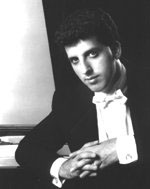 The career of pianist Jeffrey Biegel has been marked by bold, creative achievements and highlighted by a series of firsts. The career of pianist Jeffrey Biegel has been marked by bold, creative achievements and highlighted by a series of firsts.
He performed the first live internet recitals in New York and Amsterdam in 1997 and 1998, enabling him to be seen and heard by a global audience. In 1999, he assembled the largest consortium of orchestras (over 25), to celebrate the millennium with a new concerto composed for him by Ellen Taaffe Zwilich. The piece, entitled 'Millennium Fantasy for Piano and Orchestra', was premiered with the Cincinnati Symphony Orchestra. In 1997, he performed the World Premiere of the restored, original 1924 manuscript of George Gershwin's 'Rhapsody in Blue' with the Boston Pops. Charles Strouse composed a new work titled 'Concerto America' for Biegel, celebrating America and honoring the heroes and events of 9-11. Biegel premiered the piece with the Boston Pops in 2002. He transcribed the first edition of Balakirev's 'Islamey Fantasy' for piano and orchestra, which he premiered with the American Symphony Orchestra in 2001, and edited and recorded the first complete set of all '25 Preludes' by Cesar Cui.
Currently, he is assembling the first global consortium for the new 'Concerto no. 3 for Piano and Orchestra' being composed for him by Lowell Liebermann for 2005-06-07. The World Premiere will take place with the Milwaukee Symphony Orchestra, conducted by Andreas Delfs on May 12-14 2006, followed by the European Premiere with the Schleswig Holstein Symphony Orchestra, conducted by Gerard Oskamp, February 6-9, 2007.
Biegel is currently on the piano faculty at the Brooklyn Conservatory of Music at Brooklyn College, at the City University of New York (CUNY) and the Graduate Center of the City University of New York (CUNY).
|
|
|
|
|
|

Saturday, March 15, 2008
The Genius of Richard Hayman
Back in the early 1990s, my friend, Don Pippin, told me about Richard Hayman, the veteran arranger, harmonica performer and conductor. He had already been the Boston Pops arranger appointed by Arthur Fiedler after Leroy Anderson, and recorded over 50 cds for Naxos, was principal pops conductor for orchestras such as the Saint Louis Symphony, Grand Rapids Symphony and others during his long career. I knew he was getting up there in years, and as the years passed, and our schedules conflicted, it seemed less possible that we would share the stage.
Well, that changed this year--on March 15th. Our schedules coincided, and Richard invited me to perform with his Space Coast Pops in Florida. He plays golf quite regularly these days, and, at 87, he turns 88 on March 27th. That's one year for every key on the piano--well, not the Imperial Bosenforfer, as he said! I brought two works: Leroy Anderson's Concerto in C, and Gershwin's Rhapsody in Blue--the 1924 version with the original piano part, which has some 88 measures in it which had been edited out in the best known editions of the 20th century.Of course, Richard knew this piece his entire life, and also plays it on harmonica--a half-step higher than written! When I brought the solo piano score to Richard, which is indeed much larger than the tiny conductor score (Richard said, 'With such a famous piece, why can't there be a larger conductor score??!!) he decided to conduct from my solo version, which has all of the missing measures. His conductor markings are now added in my solo score, which I will cherish. I was taken with the fact that he was willing to do this version, which he had no idea existed. He liked it too.
Many of Richard's arrangements are still performed throughout the world today. But watching him conduct his own arrangements was a gift indeed. He feels the music from the inside out, and conducts it as he sways to the music, with the energy of a young man, as though the music was just off the ink press. His arrangement of 'Mack the Knife', adapted from the Kurt Weill song, is genius. He plays it on harmonica with the big band and added strings, and then breaks into the vocal like Louis Armstrong! Simply divine! This 51-piece big band is probably one of the only bands of its kind, and they were able to go from big band to Gershwin, to Anderson, to Dorsey. We surely hope Richard will grace the stages for many years to come, but truly, this icon of his generation is rare, and the audience of over 2,000 filled the Baptist Church of Merritt Island, knowing that they were in the presence of a true master of his genre. I knew it, and was in awe to be able to play these wonderful pieces with someone like Richard Hayman conducting. His humility is inspirational, as he would say, 'I'll follow you--you're the soloist, and you know what to do with these pieces'. His interpretation of the second movement of the Anderson concerto was heartfelt--reminding me of how Skitch Henderson conducted it in Carnegie Hall with me in the mid-1990s. I am indeed blessed to have worked with these legendary artists.
posted by Jeffrey Biegel
10:24 PM
|
| |



